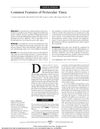27 citations,
January 2020 in “Acta dermatovenerologica Alpina, Pannonica et Adriatica (Tiskana izd.)” Healthcare workers in Turkey experienced more skin problems due to frequent handwashing and wearing masks and gloves during the COVID-19 outbreak.
 26 citations,
January 2016 in “Annals of Dermatology”
26 citations,
January 2016 in “Annals of Dermatology” Ecklonia cava polyphenols help increase human hair growth and reduce hair loss.
 25 citations,
July 2017 in “Journal of Stomatology, Oral and Maxillofacial Surgery”
25 citations,
July 2017 in “Journal of Stomatology, Oral and Maxillofacial Surgery” PRP injections help regrow hair, reduce hair loss, and increase hair thickness, but effects decrease without ongoing treatment.
 25 citations,
November 2005 in “Facial Plastic Surgery”
25 citations,
November 2005 in “Facial Plastic Surgery” The article concludes that surgeons should tailor facial surgery techniques for Asian males to their unique cultural and anatomical needs.
 22 citations,
December 2016 in “PloS one”
22 citations,
December 2016 in “PloS one” A specific protein in chicken embryos links early skin layers to feather development.
 22 citations,
August 2013 in “International journal of gynaecology and obstetrics”
22 citations,
August 2013 in “International journal of gynaecology and obstetrics” Acne severity in women with PCOS is linked to younger age, lower body weight, and more body hair, but not to hormone levels.
 21 citations,
February 2016 in “Reproductive Biomedicine Online”
21 citations,
February 2016 in “Reproductive Biomedicine Online” The conclusion suggests that PCOS may persist due to genetic traits that, while harmful for female fertility, could have provided survival and reproductive benefits to males.
 19 citations,
June 2009 in “Seminars in cutaneous medicine and surgery”
19 citations,
June 2009 in “Seminars in cutaneous medicine and surgery” Proper education can prevent traction alopecia in women of color.
 18 citations,
March 2011 in “Archives of ophthalmology”
18 citations,
March 2011 in “Archives of ophthalmology” Ringworm around the eyes often gets misdiagnosed, leading to eyelash loss, but antifungal treatment can improve the condition.
 17 citations,
November 2012 in “Journal of Investigative Dermatology”
17 citations,
November 2012 in “Journal of Investigative Dermatology” The document concludes that over 500 genes are linked to hair disorders and this knowledge is important for creating new treatments.
 15 citations,
January 2013 in “European Journal of Pediatrics”
15 citations,
January 2013 in “European Journal of Pediatrics” Patients with Shwachman-Diamond syndrome often get misdiagnosed due to a wide range of symptoms, including immune system problems and bone abnormalities.
 14 citations,
September 2015 in “Expert Opinion on Therapeutic Targets”
14 citations,
September 2015 in “Expert Opinion on Therapeutic Targets” The conclusion is that while oral contraceptive pills are effective for PCOS-related high androgen levels, new treatments with fewer side effects are needed.
 14 citations,
January 2015 in “Skin appendage disorders”
14 citations,
January 2015 in “Skin appendage disorders” Misdiagnosis of LPP in AGA patients can cause hair transplant issues.
 14 citations,
August 2014 in “Applied Physiology, Nutrition, and Metabolism”
14 citations,
August 2014 in “Applied Physiology, Nutrition, and Metabolism” A low-starch/low-dairy diet may help overweight women with PCOS lose weight and improve metabolism, but more research is needed.
 13 citations,
October 2011 in “Clinical Obstetrics and Gynecology”
13 citations,
October 2011 in “Clinical Obstetrics and Gynecology” Women with PCOS-related infertility can often conceive with treatments like clomiphene and metformin, but managing pregnancy complications is important.
 12 citations,
March 2010 in “Revista iberoamericana de micología”
12 citations,
March 2010 in “Revista iberoamericana de micología” The cat died from a hard-to-treat fungal infection despite various treatments.
 11 citations,
October 2016 in “Biomedicine & Pharmacotherapy”
11 citations,
October 2016 in “Biomedicine & Pharmacotherapy” Both human platelet lysate and minoxidil can promote hair growth, but they affect different genes and cell survival rates.
 11 citations,
May 2011 in “Journal of Cutaneous Medicine and Surgery”
11 citations,
May 2011 in “Journal of Cutaneous Medicine and Surgery” Break dancing on the head may cause a type of scarring hair loss that needs early treatment to prevent permanent damage.
 10 citations,
January 2010 in “Journal of cosmetic and laser therapy”
10 citations,
January 2010 in “Journal of cosmetic and laser therapy” The letter criticizes a study's methods and small size, suggesting larger, better-designed research would show low-level light therapy effectively grows hair.
 9 citations,
June 2011 in “International Journal of Cosmetic Science”
9 citations,
June 2011 in “International Journal of Cosmetic Science” The new mild shampoo helped prevent hair loss in the subjects.
 9 citations,
May 2005 in “Annales de dermatologie et de vénéréologie”
9 citations,
May 2005 in “Annales de dermatologie et de vénéréologie” Oral zinc and topical steroids can effectively treat chronic scalp pustules and hair loss in elderly patients.
 8 citations,
December 2021 in “International Journal of Family Studies, Food Science and Nutrition Health”
8 citations,
December 2021 in “International Journal of Family Studies, Food Science and Nutrition Health” Extra virgin olive oil may boost the immune system and help fight infections like COVID-19.
 8 citations,
January 2015 in “Journal of Cutaneous Medicine and Surgery”
8 citations,
January 2015 in “Journal of Cutaneous Medicine and Surgery” Hair restoration techniques have improved but still rely on limited donor hair, with new methods like cloning and gene therapy being explored.
 8 citations,
January 1998 in “Journal of Cutaneous Medicine and Surgery”
8 citations,
January 1998 in “Journal of Cutaneous Medicine and Surgery” Hair transplantation is effective for baldness, with new methods improving results, but staying updated is crucial for patient outcomes.
 7 citations,
January 2001 in “PharmacoEconomics”
7 citations,
January 2001 in “PharmacoEconomics” The article concludes that a balance is needed between individual healthcare needs and societal resources when it comes to lifestyle drugs, with a call for compassionate policy application.
 6 citations,
June 2017 in “Actas dermo-sifiliográficas/Actas dermo-sifiliográficas”
6 citations,
June 2017 in “Actas dermo-sifiliográficas/Actas dermo-sifiliográficas” Transplanting hair follicles into chronic ulcers helps them heal better.
 5 citations,
May 2020 in “Pharmaceutical Research”
5 citations,
May 2020 in “Pharmaceutical Research” Heat and chemicals improve finasteride delivery to scalp and hair follicles, potentially enhancing treatment for hair loss.
 5 citations,
January 2018 in “Skin appendage disorders”
5 citations,
January 2018 in “Skin appendage disorders” Minoxidil base is preferred for hair loss treatment, but minoxidil sulfate may be an alternative for unresponsive patients.
 4 citations,
January 2022 in “Journal of clinical and translational research”
4 citations,
January 2022 in “Journal of clinical and translational research” Chitosan-based dressings reduce inflammation and speed up skin wound healing.
 4 citations,
January 2018 in “International Journal of Immunopathology and Pharmacology”
4 citations,
January 2018 in “International Journal of Immunopathology and Pharmacology” Fat tissue transplant may be an effective new treatment for severe, treatment-resistant hair loss from folliculitis decalvans.




























